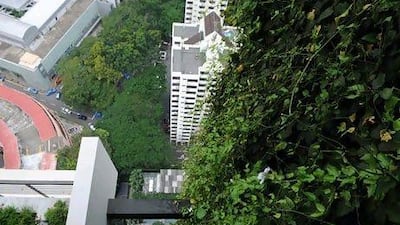The first thing that hits you about Singapore, especially when travelling from the aridity of the Gulf, is the lush greenery.
Q&A:What to do in Singapore
Has Singapore finally shaken off its disciplined and dour image? Yes. Although the city is run cleanly and efficiently, Singaporeans are fun-loving and there is plenty to do at night, even in the central business district, especially if you like Chinese food.
Is there one must-do experience? Visit the Longs Bar at the famous Raffles Hotel, followed by dinner at one of the Chinese restaurants in the Chijmes area. It's an old Christian convent bizarrely but effectively turned into a leisure spot. The Lei Garden does especially good hairy spider crab.
And afterwards? The Night Safari sounds like kids-only, but even the grown-ups say it is a magical experience invoking the feel of the nocturnal tropical jungle.
Is there much history to the place? A fishing and trading hub since time immemorial, Singapore was colonised by the British until the Japanese invasion in 1942. When British forces surrendered, Sir Winston Churchill called it the "worst disaster" in British history.
That sounds like the sort of thing it would take a long time to recover from? The Singaporeans have got over it pretty well. Independent since 1965, they have enjoyed economic growth rates and prosperity among the highest in the world.
The island city is situated almost on the equator and gets its fair share of monsoon-type rain, while remaining at a constant temperature all year round.
The result is a gardener's paradise, with exuberant blossoms and verdure everywhere. It's quite a change from the desert, and a welcome one. The downside is that humidity is high virtually all year.
Singapore's architecture, seen on the 20-minute taxi ride from Changi Airport to the central business district, symbolises its history as a Chinese settlement, with a British colonial heritage, turned 21st century commercial and financial hub. Ornate Chinese buildings nestle beside English Home Counties-style houses next to glass-and-steel skyscrapers.
The name means "Lion City" in the Malay language, and lions - or at least statuesque representations of them sometimes with a fish-tail (the "merlion") - are everywhere.
It is the second most densely populated country in the world, after Monaco, but despite this people-crush Singapore still manages to preserve open spaces, parks and gardens. Bukit Timah Nature Reserve in the middle of the island is the last of the primary rain forest that used to cover it.
The rough rule of thumb is industry to the east and west, commercial and residential in the centre; the south of the island, looking across to Indonesia, now has two big leisure resorts at Sentosa and Marina Bay.
There are international-standard hotels aplenty on the island, with all the big chains represented there. Many are located strategically around the main thoroughfare of Orchard Road, a mixture of hotels, malls, restaurants and smaller retailers. There is some expensive high-rise accommodation on the avenues and boulevards running off the main road.
Night life is vibrant. The city used to have a reputation for being heavily regimented and controlled, but during the evening Singaporeans seem to throw off the image of dourness in a hubbub of outdoor street restaurants, bars and cafes.
Top 5: Top 5 places to eat in Singapore.
1 Absinthe.
2 Keyaki.
3 Morton's Steak House
4 Nicolas Le Restaurant.
5 Melt: The World Cafe.
Source: TripAdvisor
The area around Orchard Towers, a multi-storey retail and leisure development, is particularly lively.
The Quote: "The city of Singapore was invented by a man who said 'here is where we must have a city, half way between India and China." Author JG Farrell

